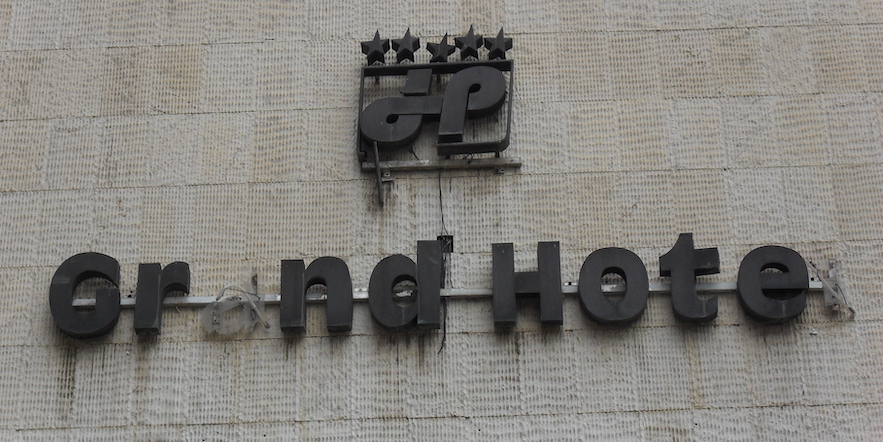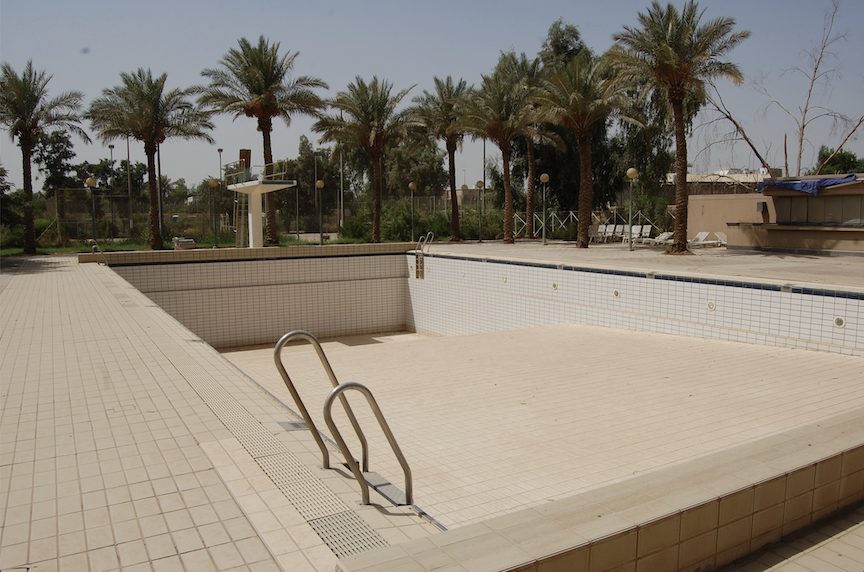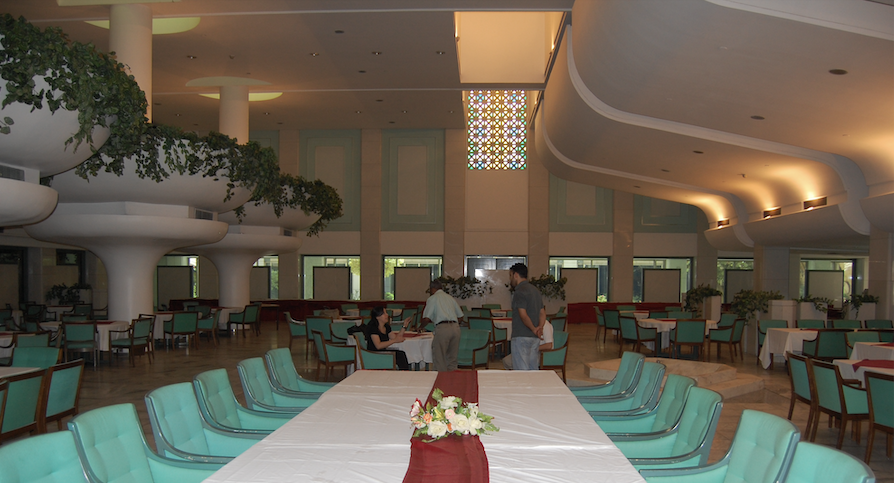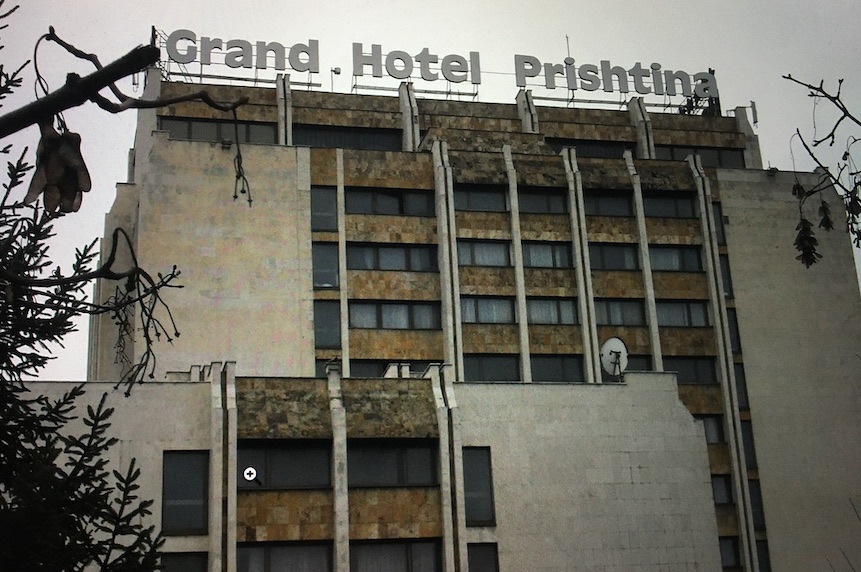
Don’t be too dismissive of Prishtina’s Gr.and Hote.. During the civil wars attending the breakup of Yugoslavia, hoteliers’ top priorities were keeping the boilers running and finding food for the restaurant. Clean sheets, pleasant surroundings and modern amenities rarely were available. Photo by Jamie Bowman
By Olivia Ward
You won’t find these hotels in a guidebook of great getaways. Amenities are woeful. Rooms aren’t clean or relaxing. You’ll find no vacationing families or romantic couples in the bar or restaurant.
But for Olivia Ward, a Toronto Star war correspondent assigned to cover authoritarian hell holes ranging from the Balkans to Central Asia. Five-star spa resorts simply were not available. She stayed in hotels of last resort. Here is her story:
Arriving for a first visit in Iraq to cover Operation Desert Fox, a four-day bombing campaign that preceded 1990’s Operation Desert Storm, I was determined not to stay in the notorious Al Rasheed, origin of a thousand CNN soundbites beginning “as bombs fell over Baghdad … ”
“There are other hotels, ” said my driver as we sped into the city. “Nice hotel, the Sheraton. Better than Al Rasheed.”
But inexplicably, his car pulled up at the Al Rasheed inside what later became known as the Green Zone. And while I was still protesting, three middle-aged bellmen had a tug-of-war with my luggage, eventually trundling it to the reception desk.
Service With a Smile
“Perhaps there’s no room, ” I said hopefully. “Lots of room,” said the desk clerk with a toothy welcoming smile I was to see, night and day, for the next two weeks.
“What about the Sheraton …?” I said weakly. “Very nice hotel, Sheraton,” said the clerk approvingly, handing me my key.
My fate sealed, I ran the gamut of watchers, lurkers and minders who lined the long corridors, livened by 1950s Christmas Muzak. They, I discovered, were the reason why journalists were not allowed into other hotels, however nice. Iraq clearly was a police state with layers of surveillance keeping watch on all foreigners. But even the omnipotent Saddam Hussein with all his resources had limitations.
The Al Rasheed was a giant spy laboratory, and like it or not, its guests were cast in the role of the rats. My room was large, with a lugubrious dimness that set an immediately ominous tone. Ringing the concierge, I demanded replacements for the many burnt-out lightbulbs that sat uselessly in the grubby lamps.
Shortly a team arrived – nobody at the Al Rasheed operated in less than pairs – and two smiling men surveyed the problem.
“Everything’s fine, you have four lights working, ” said one.
“But I can hardly see to read, ” I sputtered.
“Each room, only four lights, ” he reiterated.

For the Al Rasheed Hotel, the toppling of Saddam Hussein in 2003 was the best and worst of times. The hotel was taken over by the U.S. which used it as a short-term barracks and dining facility. But as its use as a commercial hotel shrank so did its recreational facilities and other amenities associated with a commercial hotel. Photo by David DeVoss
Crunchy, Dusty and Dim
Feeling like a colonial memsahib berating the natives, I was at a loss to know what to do next. This was, after all, a country where most people suffered daily power cuts and malnutrition was the rule rather than the exception. But the other smiling helper interjected, “Many people like more light. Can be fixed.”
They both stared at me expectantly. And at my handbag, bulging with near-worthless Iraqi dinars. Palms were crossed, and I soon had a better look at the room, which was more appealing in the dark.
Kicking off my shoes, I sank into a crunchy layer of unidentified objects that settled nastily between my toes. The dusty beige carpet was just that – more dust than carpet.
But there was enough dirt left over to line the small empty refrigerator that was, in better days, a minibar. Streaked and splashed with substances that didn’t bear thinking about, it was tacky to the touch.
The bathroom boasted a piece of bright-pink soap generously donated by the previous tenant, who left behind a few springy black hairs as a silent memorial.
The limp gray towels had a texture I’d never encountered, puzzlingly slimy and clammy despite the desert climate.
“If you want a clean room, you have to pay, ” explained a colleague who had made many trips to the hotel. “Just make a deal with the housekeeper.”
From the look of the room, nobody before me had ever taken his advice, or perhaps valued sanitation enough to splash out a few dinars.

Baghdad’s Al Rasheed Hotel had a large restaurant that was used as a dining facility for American troops, diplomats and contractors for several years after the U.S. toppled Saddam Hussein. Following Washington’s troop withdrawal in 2011 it went unused except for special events. Photo by David DeVoss
Serbia, Albania, Kosovo. What Could Go Wrong?
But grime isn’t the worst bugbear of the hell hotel.
In Kosovo, where months of civil strife left hundreds of thousands homeless, it seemed churlish to complain about accommodations. But in the provincial capital, Pristina, the brooding Grand Hotel quickly strangled any forgiving sentiments at birth.
Before the Kosovo war ended Serbian control of the mainly Albanian province, the euphemistically named Grand Hotel had the furtive and sinister atmosphere of a building that is up to no good.
Flanked by the headquarters of the Serbian police, its lobby was permanently inhabited by hulking men in leather jackets who sat smoking and glaring until relieved by the next shift.
Exiting the claustrophobic, creaking lift, I was surprised to find my room as brilliantly lit as a police interrogation cell, which it strongly resembled. (Later I was to discover that part of the hotel was, in fact, reserved for an official torture chamber.) Too weary to quibble after a six-hour bus trip over icy roads from Belgrade, I threw myself on the sagging bed, and a few moments later, prepared to crawl in for the night.
That was clearly a mistake. Throwing back the threadbare cover, I found myself the victim of a practical joke. Here was the Yugoslav version of the famous summer camp “short sheets” gag. Half the width of a normal sheet, the one that faced me resembled an elongated tea towel, leaving huge swaths of musty, bristly blanket bare on either side. On contact with the fabric, my skin began to itch violently.
Cursing myself for forgetting my sleeping bag, I tried to settle into a corpse-like position, with my extremities firmly tucked under the narrow strip of linen. Throughout a long and ugly night of scratching and cursing, I was all too painfully aware of being alive.
Nor was the discomfort soothed by the din that pounded up from the street, where a local disco was only warming up at midnight. By 3 a.m. the last guests were straggling drunkenly home, blasting rounds of ammunition into the air in bleary benediction.
Combat trained, I threw myself on the floor muttering “an attack,” and crawled groggily toward my clothes.
Wrapped in my coat I faced the dawn, which came up like thunder along with the town’s garbage trucks, rumbling through the back streets. For a grand finale, Pristina’s flocks of blackbirds, for which the ancient city was named, made their shrieking debut, streaking across the sky like smudges of smoke.

During the 1999 war in Kosovo Prishtina’s Grand Hotel became the hotel of last resort for journalists, diplomats and civilian contractors. Photo by Jamie Bowman
A Vacation from Chechnya
Ironically, my sojourn to Ingushetia, a strife-torn Russian republic wedged alongside North Ossetia and Georgia in the Northern Caucasus, made me long for the solitary miseries of the Grand. I wanted to stay at the Assa Hotel because it resembled a serene Taj Mahal and offered the promise of blessed relief to mud-spattered and battle-weary reporters escaping Chechnya. But once inside, the reception was anything but idyllic.
“We can’t let you stay, there are politicians coming, ” said the sour clerk manning (or rather, woman-ing) the elegant marble counter.
“How many?” I inquired.
“Maybe 20, ” she shrugged.
Arguing that the hotel held several hundred, and there were only two of us, we stood our ground, stamping our filthy boots on the immaculate floors until a small, irritable manager appeared to hand out keys.
“You can’t eat here, ” he hissed, as we lugged our leaden bags and flak jackets to our rooms, past an elderly bellman who pointedly ignored us. After a blissful shower, and a dinner of stale biscuits with my colleague Igor, I settled down to write in my room.
At 1 a.m., still sitting at the desk, I heard panting noises and heavy footfalls along the corridor. Before I could reach the door, it was smashed open.
To my astonishment, a gaggle of gun-toting militiamen was crawling over the room, opening every door, and peering under the bed like Keystone Kops.
“We’re looking for a man!” hissed their leader, the Fat One.
“Then try a disco, ” I sighed.
In answer, one of the recruits flung me against the wall.
The others wrenched open the window and pointed to the sky. I joined them, squinting upwards at … a knotted sheet that dangled above a neighboring patio, lowered from an upper floor.
Screaming the Ingush equivalent of “aha, ” the gang tore out of my room, smashing down the next door. But it was too late. Amply warned, the culprit had fled.
Giving up any idea of sleep, I returned to my computer.
Half an hour later, the Keystone Kops were back in the corridor. Pre-empting them, I threw open my door, and they tumbled in, guns drawn.
“Keep this up and I’m going to charge you for half the room, ” I scowled.
But they were already pounding down the stairs to the street, in hot pursuit of a small, skinny perpetrator who hardly seemed worth the trouble. His crime, I later learned, was belonging to a rival mafia to the then director of the hotel.
Venturing Into the Heart of Russia
In the crime-infested Siberian border city of Yekaterinburg, however, even the Ingush Stooges would have been welcome company.
Returning to the cold, cavernous Oktyabrskaya Hotel after an interview was abruptly canceled because the subject had been summarily shot, I was in the mood for some cheering up. But the most mood-lifting occurrence – a change of hotel – was not to be.
“There is a much better hotel, ” said a local journalist sympathetically. “But you won’t be able to stay in it. Only communist party members or top Mafiosi go there.”
Never have I come so close to signing up for the communist party.
Back in my house of horrors, the tone was set by the lobby, which favored much black marble and little light. Men with obvious bulges under their arms lounged against the walls, hurling one another seriously challenging glances.
I hurried to my room, as quickly as possible and immediately locked the flimsy door. But just after midnight, as I turned off the light, the tomb-like hostelry sprang alive in Dracula fashion. Blood-curdling shrieks echoed down the corridors, followed by curses from deep male voices that seemed to boom up from the bottom of a vodka vat.
This was the Oktyabrskaya’s nightly routine of “negotiations” between the local hookers and their clients. Followed by thunderous door slammings once the price was agreed upon, and a few moments later, more screaming arguments as the clients reneged on the bargain. Gunshots ended the disputes.
Dragging myself out of the small bed, I found the strength to wrestle a huge Soviet armoire against the door. I might not be able to leave the room easily, I reckoned. But it was better than knowing I would never leave it alive.
After a night of continuing alarms and diversions, I dislodged the armoire and opened the door on a scene that would have done Alfred Hitchcock proud.
There, on her knees, was an elderly maid mopping blood from the floorboards and walls. Startled at my sudden appearance, she wished me a smiling “good morning” and continued with her duties.
Tajikistan or Bust
No such cheer greeted me in Dushanbe at the massive Hotel Tajikistan, home to a thousand post 9/11 journalists desperate to be on their way to Afghanistan. The staff, who had seen nothing more than occasional Moscow functionaries and provincial politicians for the last few years, were suddenly overwhelmed by a solid wall of hacks demanding space.
Taking half an hour or more to check in one person, they managed to hold the crowds at bay. Some of the wearier journos flopped into armchairs and fell asleep rent-free.
Congratulating myself on my good luck at finally finding a bed in this alarmingly overpopulated Central Asian capital, I dragged my stock of water and emergency supplies into the tiny “double” room, where furniture outnumbered floor space by a ratio of two to one.
Opening closet or bathroom doors was impossible, as was navigating the room without mountain climbing gear. A double room, I learned, was like a single room – but with twice the furniture. The price, of course, went with the furniture.
Completing the exhausting and frustrating task of unpacking, and setting up my computer equipment, I felt a rare headache coming on. Within seconds it was worse: from somewhere outside, a frightful, pounding beat rose like the armies of Genghis Khan galloping toward the city gates.
Above the beat soared an amplified man’s voice, first guttural, then rasping, and finally shrieking as though the owner were impaled by Genghis himself.
“What in hell’s name is that?” I asked the sour-faced concierge.
“Ah, “she said with a hint of a smile. “Tajik wedding.”
And so it went. Every afternoon and evening in the courtyard of the hotel. Sound waves so intense they must have done structural damage to the foundations.
“Does this happen every day of the year?” I asked in despair.
“No, no, ” she replied. “Only after the cotton-planting season.”
Having labored in the drought-ridden fields for months, Tajiks apparently felt the urge to merge in holy matrimony. My hotel was the venue of choice for the unholy after parties.
The thought of a long celebratory winter made Afghanistan seem increasingly attractive.![]()
Olivia Ward was a foreign affairs reporter, correspondent and bureau chief for the Toronto Star at the UN, in the former Soviet Union, Europe and the Middle East. She is now a documentary filmmaker.

